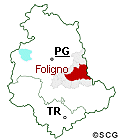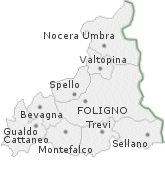Appointments & Events
Exhibitions, concerts, festivals, reviews, appointments, events and more happening in and around Foligno over the next couple of months. Updated daily.
|
|
Appointments & EventsExhibitions, concerts, festivals, reviews, appointments, events and more happening in and around Foligno over the next couple of months. Updated daily. RestaurantsList of restaurants in Foligno PizzerieList of pizzerie in Foligno HotelsList of Hotels in Foligno Holiday FarmsList of Holiday Farms in Foligno. The Park of Colfiorito, Umbria's Smallest Natural ParkAt between 750 and 790 metres above sea level, this is the smallest of the six national parks in Umbria. Rare plant and animal life exists here, while centuries of infiltrations of water coupled with the geology of the area have produced a network of basins that act as the source of many of the region's water springs. Umbrian Textiles and Embroidery Tour - Period Costume Embroidery in Foligno Arnaldo Caprai Textile Collection Colfiorito, Rich in History and Sophisticated DelicaciesRich in history, this land was a crossroads between Etruria and the Adriatic Sea (the Iron Road). Remains of axes dating back to the Bronze Age have been unearthed in this area, which is also famed for its fine cuisine. Amont the best known products of the area is the legendary Colfiorito red potato, a favourite among the world's top chefs. Roman and Paleo-Christian Fragments in a Basilica Near FolignoAt San Giovanni Profiamma, a village just four kilometres outside Foligno on the Via Flaminia, the church of San Giovanni Battista is worth visiting on account of the exceptionally harmonious mixture of Roman and paleo-Christian architectural fragments incorporated into the decoration. These include a fine Roman sarcophagus that has been walled into the right hand wall of the church. A Look at History Through Ex-VotoBuilt in 1450 on an inaccessible crag of rock immersed in the green of the surrounding countryside, this sanctuary is an important religious place of pilgrimage for those living in the hills behind Foligno. Although the church itself is very small, it contains an incredible number of ex-voto. Visitors are advised to read the messages of thanks written on the votive offerings, as an interesting way of getting to know some of the history of the area. The Architectural Gem of AnnifoThe small village of Annifo stands in the middle of the Umbrian hills and is the site of a charming architectural gem: a minute sanctuary measuring 7x4 metres with a very fine fresco depicting maternity in the interior. Discovering Ancient Treasures with ArcheoclubA branch of dell’Archeoclub Italia, the Foligno Archeoclub specialises in discovering the area's less well-known archaeological riches as well as offering a more in-depth view of those that are familiar the world over. The guided tour to the Plestini or Colfiorito plains aims to bring out the archaeologist in even the least receptive of visitors. A Family Film ClubThe Ordet film club has a collection of American, French and Italian films with the family and future as their theme. The video library is open to members, who can also consult specialised magazines. All the relevant addresses for further information regarding their rich 2003 programme is available. A Vanished SanctuaryAlong the old Via Plestina (ss. 77 Val di Chienti) after Pale, there is a small village called Ponte Santa Lucia that takes its name from a sanctuary to St Lucy that stood here once. The stones of the sanctuary itself have been used to build a bridge. Also noteworthy is the Madonna di Sasso Morino, an important venue for the people of the area. The Canape' Park in FolignoAn ideal starting point to visit all of Foligno's major sights situated nearby. The park began life as a meeting place but quickly became an amusement ground with a circus, horse racing and even cycling. The Altolina Valley and its CavesA unique place rich in history, the geological conformation offers considerable diversity within a small area, from waterfalls to caves carved in stalactites and stalagmites by the river Menotre. The magnificent 180 million-year-old Sasso di Pale is clearly visible from the road. It is probable that a sea, part of the ancient ‘Telide’ ocean, reached as far as this spot. The Abbey of SassovivoFoligno's best known abbey, Sassovivo is an ideal starting place for anyone wishing to embark on a tour of the area. The abbey stands near a mineral water spring with proven benefic qualities, and one of the most interesting ilex woods of the region. The wood is crossed by a footpath that is ideal for easy walkers in search of fine views. Pale, Its Caves and WaterfallsThis small village near Foligno stands atop a rocky outcrop. The Romans built part of the Via Flaminia here, later changing its course to another route. Among the many Roman remains in the region, the most imposing is a section of acqueduct that is still standing. This area was also known for its production of paper, which supplied even the Vatican and was used for the first printed edition of Dante's Divine Comedy. The Hermitage and Sanctuary of Santa Maria Giacobbe, Carved Out of Sheer RockOne of the most mysterious and mystical places around Foligno, the Sasso di Pale was built in 1200 to worship ‘Maria Jacobi’, one of the pious women supposed to have been present at the cucifixion of Christ and who popular tradition tells retired here to lead a life of penance. The First Copy of the Divine Comedy in FolignoThe first printed copy of the Divine Comedy was printed on April 11th 1472 in Foligno. The city commemorates this event with a reading some of Dante's canti. May has been chosen as the month for the ‘Celebrazione Dantesca’ celebration of the poet. Via della Spina, An Ancient Roman RoadUsed since ancient times, the Via della Spina was even trodden by Hannibal's army on its way to Rome. Today the road is dotted with numerous large and smaller castles, built in the Middle Ages when it was the only route from Spoleto, and therefore Rome, to the Adriatic coast. Today the road is virtually deserted but highly interesting for anyone in search of history. The Paper RoadJust one of the many activities organised by the Foligno-based Valle Umbra Trekking, whose expert guides artfully combine education with amusement in a series of interesting excursions through the countryside. Along with La Via della Carta, this group's 2003 programme includes an excursoin on the ‘Il Castelliere’ natural path or walks 'In the Footsteps of St Francis'. Star-Gazing Through the City's TelescopeIt is now possible to watch the stars through the computerised telescope of the Associazione Astronomica Antares. The association organises meekly astronomy meetings in Foligno, for anyone interested in watching the stars and getting familiar with planets and constellations in the company of an expert astronomer. MusicalMente Cultural AssociationThe goal of this association is to favour meetings between young musicians. Open to all musical genres, provided they are of good quality. The association has organised several editions of the successful Sound Track competition, open to new musical talent. The Foligno CAI 2003 Excursion ProgrammeThe 2003 programme is rich in a variety of interesting outings that offer the possibility to explore Umbria's lesser known marvels as seen from the region's many footpaths. Excursions include ‘The Olive Trail’ or ‘The Rocchetta Springs’. Keeping Up a Footpath for a Day with CAIFoligno's branch of the CAI association is offering a rare chance to take part in maintaining an old footpath that crosses the hills behind Foligno itself and arrives at Assisi after passing by Sassovivo and Pale. Just one of the interesting activities in the CAI's exciting schedule designed for those who love being in touch with nature combined with culture and trekking. 2003 Concert SeasonThe rich concert season in Foligno features a range of different kinds of works spanning the tango of Gardel and Piazzolla to readings and music inspired by the operas of Verdi read by Arnoldo Foà. Also running this season are ‘Cavalleria Rusticana’, ‘Bohème’ and some works by Beethoven. Information and bookings. Sant'Eraclio, Carnival in a CastleThe history of this little village goes back a long way. Its main feature is the castle, built by the lords of Foligno, that is still inhabited. For almost 500 years now, the most renowned carnival of the region is celebrated here. OLT Drama GroupThe Olt Dama Group, is a young alternative theatre group. The group has already accumulated a considerable number of experiences in theatre and is also active in making short films. Their supporters include Carlo Rambaldi (triple Oscar winner), who has helped the group with some of the special effects in their performances. The Castle at VerchianoVerchiano is a small village in the hills near Foligno, with strong hisorical ties to the city. The castle is currently undergoing restoration but the village also boasts a 1300 sancruary where Beato Paolo Trinci is buried. September 1st - 15th - Quintana Joust |
|
Foligno |
| FOLIGNATE AREA |

|
|
Province: Perugia Area: Folignate () 
|
| INFORMATION |
|
FIGURES
Comune di Foligno Some Famous Personalities: Beata Angela da Foligno (1248-1304); Gentile da Foligno (medico, metà sec. XIV-1416); Nicolò Tignosi (medico, 1402-1474); Niccolò di Liberatore detto l'Alunno (pittore, 1430-1502); Pier Antonio Mezzastris (pittore, 1430-1506); Tommasuccio da Foligno (poeta, sec. XV); Ugolino Trinci (condottiero, seconda metà XIV sec.-1415); Ludovico Jacobilli (storico, 1598-1664); Giovan Battista Michelini detto Il Folignate (pittore, 1604-1655); Antonio Liberati (musicista, 1617-1685); Feliciano Scarpellini (astronomo, 1762-1840); Matteo Nuti detto Matteo da Fano (architetto, XV sec.); Giuseppe Piermarini (architetto, 1734-1808); Michele Falocci Pulignani (erudito, 1856-1940).
|